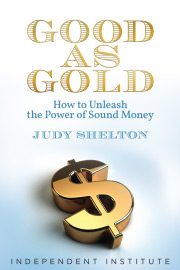Since Federal Reserve Chairman Ben Bernanke testified before Congress’s Joint Economic Committee Wednesday morning, commenting on the economic outlook and responding to questions from lawmakers on the likely path of monetary policy, financial markets have experienced turmoil. Triple-digit gains in the Dow Jones Industrial Average turned negative later that afternoon. That spurred a 7.3% plunge in the Japanese stock market, which in turn dragged down bourses in Frankfurt, London, Paris and Rome on Thursday morning—sending U.S. stocks on a roller-coaster ride.
Mr. Bernanke must be thinking: “Was it something I said?”
We should be asking ourselves a different question: Does it make sense for financial and economic outcomes to be so highly dependent on the pronouncements of a single individual? Would it be better if monetary policy were more rules-based and less discretionary?
In the midst of heightened concern over the hazards of overreaching government agencies, this may be a propitious moment to review the Fed’s outsize role in determining the price and availability of capital. Instead of granting sweeping powers based on the judgment of its chairman—or relying on the collective omniscience of its 12-member Federal Open Market Committee—we would do well to examine whether some objective rule or standard might better calibrate the supply of money and credit to the needs of the real economy.
Fortuitously, the Joint Economic Committee’s chairman, Rep. Kevin Brady (R., Texas), introduced legislation two months ago to begin that examination. The Centennial Monetary Commission Act of 2013 would establish a commission to analyze whether the Fed has improved economic performance or whether an alternative monetary regime based on a specific target—in terms of an inflation index, nominal gross domestic product, or the price of gold—might provide a more stable platform for productive growth. As Rep. Brady bluntly told Mr. Bernanke at Wednesday’s hearing, “My worry is that the Fed doesn’t have the prescription for what ails our economy.”
Clearly, the Fed hasn’t shied away from prescriptions. In his legislation, Mr. Brady cites the extraordinary actions taken in recent years with regard to “multiple rounds of quantitative easing, providing unprecedented liquidity to financial markets, while committing to holding short-term interest rates low for a seemingly indefinite period, and pursuing a policy of credit allocation by purchasing Federal agency debt and mortgage-backed securities.”
These moves by our central bank might be construed as going beyond any reasonable definition of limited government. Yet it is important to note that the Brady initiative does not seek to push an ideological agenda but rather to gather facts. The monetary commission would be charged with scrutinizing economic data on output, employment, prices and financial stability associated with various monetary systems during our nation’s history, particularly since the creation of the Federal Reserve System in 1913.
The Constitution grants authority to “coin money” and regulate its value to Congress—not the Federal Reserve—so it is entirely appropriate at the 100-year mark to authorize a congressional review of the government agency to which monetary powers have been delegated. Indeed, given the Fed’s dominant role in financing the national debt, it is important to evaluate its decisions in terms of fiscal complicity. What, for instance, is the impact of prolonged monetary accommodation on the growth of government? And how does it impact private-sector initiative?
It also makes sense to evaluate the potential benefits of moving toward a different operational approach or alternative monetary regime. Should we continue to rely on the discretion of monetary officials to get it right? Or would inherent free-market mechanisms better allocate financial capital if the private sector knew in advance that monetary policy was based on an observable, well-defined target and adjustments were automatically implemented?
There is no guarantee that a Centennial Monetary Commission would end up recommending anything beyond the status quo, of course. Plenty of people consider Mr. Bernanke’s flexibility to push up stocks, bonds, housing prices and other assets through unorthodox methods as essential for recovery. Even if there is uneasiness about the ad hoc quality of such actions—with the FOMC sometimes making up monetary policy as it goes along—investment portfolios have mostly recouped losses suffered in the wake of the 2008 financial crisis.
Then again, there are many others who point to the Fed’s inability to predict and its culpability in fueling that crisis. So even if pumped-up asset prices provide some comfort, it doesn’t mean that our current discretionary monetary regime is the best way to deliver long-term economic growth. Short memories do not serve the cause of sound money.
How best, then, can Congress carry out its monetary responsibility to provide money in keeping with constitutional precepts? It is clear that the Founders meant for Congress to ensure that the nation’s monetary standard would be as reliable and well-defined as its other official measures. Lawmakers should remember that the power to regulate the value of money is enumerated in the same sentence (Article I, Section 8) as the power to fix the standard of weights and measures.
That is precisely why we need a bipartisan commission to evaluate the Fed’s monetary decision-making process in both quantitative and qualitative terms. Is monetary policy determined in a way consistent with American principles—or have we turned away from the rule of law for the rule of men.









